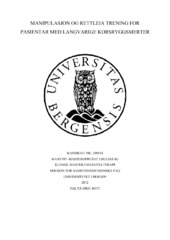| dc.contributor.author | Sande, Hanne Mette | en_US |
| dc.date.accessioned | 2013-07-17T12:00:06Z | |
| dc.date.available | 2013-07-17T12:00:06Z | |
| dc.date.issued | 2012-10-31 | eng |
| dc.date.submitted | 2012-10-31 | eng |
| dc.identifier.uri | https://hdl.handle.net/1956/6830 | |
| dc.description.abstract | Background data: Spinal manipulation and supervised exercise therapy have shown effect on long-lasting low back pain, but few studies combine these interventions. Due too new science about central stimulated pain in long-lasting low back pain patients it is also in interesting to see if a cognitive behavioural therapy is effective. Object: Does spinal manipulation and supervised exercise in combination with cognitive behavioural therapy have an effect on long-lasting low back pain? Materials and method: In this study, single subject study design (SSED) was used, and two participants were included. The intervention was spinal manipulation followed by supervised exercise with cognitive behavioural strategy. Eight treatments were given over a period of four weeks. The outcome measurement was Numeric Pain Rating Scale (NPRS) for pain, Roland Morris Questionnaire (RMQ) and Back Performance Scale (BPS) for function, and COOP/WONCA for health related quality of life. The test was preformed at baseline, after the intervention period and at three months follow-up. Result: After treatment both patients had reduced pain and improvement in function, and the improvement was of clinical importance in NPRS and RMQ. Only the woman had a result that was clinical important in BPS. Small differences were found in COOP/WONCA for both patients, but the woman had the greatest change in quality of life. Conclusion: The study shows a trend that spinal manipulation and supervised exercise with cognitive behavioural strategy can have an effect on long-lasting low back pain. Randomised controlled trails (RCT) are necessary to confirm the positive trend of this treatment in the future. | en_US |
| dc.description.abstract | Bakgrunn: Både manipulasjon og rettleia trening har vist seg å ha effekt på langvarige korsryggsmerter, men få studiar har studert effekt av ein kombinasjon av intervensjonane. Med bakgrunn i ny vitskap om sentral sensitivisering ved langvarige smerter, er det også interessant å sjå om kognitiv tilnærming kan vere effektivt i behandlinga. Problemstilling: Har manipulasjon i kombinasjon med rettleia trening med kognitiv tilnærming effekt på langvarige korsryggsmerter? Metode: Single subject study design (SSED) vart brukt i studien, og to forsøkspersonar vart inkludert. Intervensjonen var manipulasjon etterfølgt av rettleia trening med kognitiv tilnærming. Det blei gitt åtte behandlingar over fire veker. Utfallsmåla var smerte, sjølvrapportert og målt dagleg funksjon, og helserelatert livskvalitet. Numeric Pain Raiting Scale (NPRS), Roland Morris Questionnaire (RMQ), Back Performance Scale (BPS) og COOP/WONCA blei brukt som måleinstrument. Testane vart utført tre gangar ved baseline, rett etter intervensjonen, og ved tre månadars oppfølging. Resultat: Begge pasientane hadde redusert smerte og betre funksjon etter intervensjonen, og endringa var klinisk viktig på NPRS og RMQ. Berre kvinna viste klinisk viktig på BPS. På COOP/WONCA var det liten forskjell frå baseline hos forsøkspersonane, men også her hadde kvinna størst endring. Konklusjon: Studiet viste ein tendens til at manipulasjon i kombinasjon med rettleia trening med kognitiv tilnærming kan ha effekt på pasientar med langvarige korsryggsmerter. I framtida er det behov for fleire randomiserte kontrollerte studiar (RCT) innanfor området som kan understøtte resultata. | en_US |
| dc.format.extent | 1861358 bytes | eng |
| dc.format.mimetype | application/pdf | eng |
| dc.language.iso | nno | eng |
| dc.publisher | The University of Bergen | eng |
| dc.subject | Korsryggsmerter | eng |
| dc.subject | Livskvalitet | eng |
| dc.subject | Manuellterapi | eng |
| dc.subject | Fysioterapi | eng |
| dc.subject.mesh | Low Back Pain | eng |
| dc.subject.mesh | Quality of Life | eng |
| dc.subject.mesh | Musculoskeletal Manipulations | eng |
| dc.title | Manipulasjon og rettleia trening for pasientar med langvarige korsryggsmerter | en_US |
| dc.type | Master thesis | |
| dc.rights.holder | Copyright the author. All rights reserved | |
| dc.description.degree | Master i Klinisk masterstudium for fysioterapeuter i manuell terapi (MFMT | |
| dc.description.localcode | MAMD-MANT | |
| dc.description.localcode | MANT395 | |
| dc.subject.nus | 761901 | eng |
| fs.subjectcode | MANT395 | |
